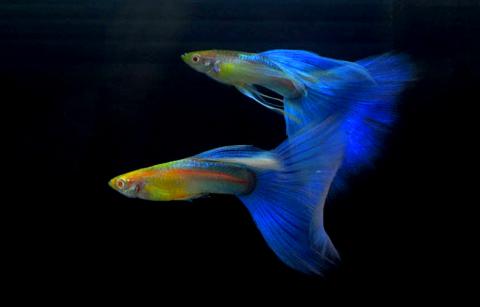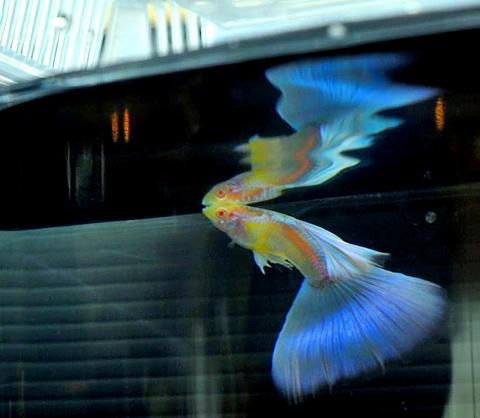Not many people would call themselves gods, but for guppy breeders like Andrew Lim, it’s pretty darn close to the truth.
“You can create whatever you want,” Lim says. It’s instant gratification genetic manipulation, as guppies can give birth to between 20 and 200 fry per month. The frequency and quantity allows for a huge pool of candidates to mix and match with — it’s like evolution in fast forward.
Lim, who hails from Malaysia, is sitting in a space walled off by fishtanks in the middle of a busy mall in Yilan City. He’s one of the five judges for the 9th World Guppy Beauty Competition, which received 198 submissions this year from five countries. The fish are judged according to appearance and activity in 18 strain and age categories, with the winners taking home cash.

Photo: Han Cheung, Taipei Times
Breeder Chuck Lu (盧禹辰) says that Taiwan is the top guppy breeding country in the world. He may be exaggerating, but note that for the past four years, Taiwanese breeders have dominated the World Guppy Contest, which is considered the world championships with an average of 600 submissions. Held in a different country each year, Taiwan will be hosting this summer’s event for the second time since its inception in 1996.
GENETIC MIX AND MATCH
Curious passersby examine the fish, which probably appear quite different from the ones found in Trinidad by their namesake, British naturalist Robert John Lechmere Guppy. There’s a multitude of colors, even albinos. Some have back fins that droop over their sides, and others boast large, fanned tail fins — these belong to the “evening gown” category. Lu says Taiwan is the pioneer of these souped up fins.

Photo: Han Cheung, Taipei Times
Each tank has at least one male and female, with the male being the flamboyant one. The female is larger and duller, amounting to 10 percent of the total score. Lim says they require contestants to display both genders to prove that they are breeders and did not purchase the fish just for the contest.
“The judges need to have a basic understanding of genetics to tell if both fish belong to the same strain,” he says. “If not, the breeder is disqualified.”
Some have fins so large that they seem to be weighed down when they swim. Lim admits that this is a burden on the fish, which may shorten their lives by a few months. But pushing genetic boundaries seems to be the main draw for these enthusiasts — there’s even a “new strain” category for people who like to mix and match.
“You might wonder if the offspring of a blue guppy and red one will turn out to be purple,” breeder Wu Kun (吳焜) says. “But you don’t know what will happen until you do it. That’s why it’s fun. If it really turns out purple, maybe you’ll get to name this new strain.”
Lu describes his dream fish: metallic in the front, snake pattern in the middle and lace pattern for the tail. But he adds that it’s not enough just to create the fish — the ultimate goal is to stabilize the genetic pool so that at least 60 percent of the offspring carry the same characteristics.
Since the guppies have such a high birth rate, serious breeders require a lot of space — Wu has about 200 20-liter tanks, while some have up to 400. Even the casual hobbyist would require at least 10, he says.
DILIGENT BREEDERS
Wu enjoys comparing raising methods, which can cause fish of the same age to vary in size. He says his fish are smaller because he has a full-time job. It boils down to diligence in keeping the water clean and the food — the most expensive part of guppy raising is the newly-hatched brine shrimp, rich in protein and easily digestible, which is used to feed the young fish.
However, the fish start fasting a day before they arrive at a show — Wu says since they usually stay in the same tank for a few days, breeders want to reduce the feces produced to keep the water clean and the fish healthy. One breeder, however, rode his motorcycle six hours and back from Tamsui to Yilan just to change the water.
Foreign contestants don’t retrieve their fish as they might die from fasting and being in the same tank for too long. They are auctioned off at the show or adopted by local breeders.
Most winners are not around to receive their trophies. A representative from the Taiwan Guppy Association accepts all three top awards for its members, but he has no time to talk because he has the unenviable job of safely transporting more than 10 tanks back to Taipei.
Meanwhile, there’s little time to rest. With about three months left until July’s big bout, the breeders will be working diligently to make sure Taiwan remains on top of the guppy world.
“Competitions are the best way to maintain enthusiasm,” Wu says.

Google unveiled an artificial intelligence tool Wednesday that its scientists said would help unravel the mysteries of the human genome — and could one day lead to new treatments for diseases. The deep learning model AlphaGenome was hailed by outside researchers as a “breakthrough” that would let scientists study and even simulate the roots of difficult-to-treat genetic diseases. While the first complete map of the human genome in 2003 “gave us the book of life, reading it remained a challenge,” Pushmeet Kohli, vice president of research at Google DeepMind, told journalists. “We have the text,” he said, which is a sequence of

On a harsh winter afternoon last month, 2,000 protesters marched and chanted slogans such as “CCP out” and “Korea for Koreans” in Seoul’s popular Gangnam District. Participants — mostly students — wore caps printed with the Chinese characters for “exterminate communism” (滅共) and held banners reading “Heaven will destroy the Chinese Communist Party” (天滅中共). During the march, Park Jun-young, the leader of the protest organizer “Free University,” a conservative youth movement, who was on a hunger strike, collapsed after delivering a speech in sub-zero temperatures and was later hospitalized. Several protesters shaved their heads at the end of the demonstration. A

Every now and then, even hardcore hikers like to sleep in, leave the heavy gear at home and just enjoy a relaxed half-day stroll in the mountains: no cold, no steep uphills, no pressure to walk a certain distance in a day. In the winter, the mild climate and lower elevations of the forests in Taiwan’s far south offer a number of easy escapes like this. A prime example is the river above Mudan Reservoir (牡丹水庫): with shallow water, gentle current, abundant wildlife and a complete lack of tourists, this walk is accessible to nearly everyone but still feels quite remote.

In August of 1949 American journalist Darrell Berrigan toured occupied Formosa and on Aug. 13 published “Should We Grab Formosa?” in the Saturday Evening Post. Berrigan, cataloguing the numerous horrors of corruption and looting the occupying Republic of China (ROC) was inflicting on the locals, advocated outright annexation of Taiwan by the US. He contended the islanders would welcome that. Berrigan also observed that the islanders were planning another revolt, and wrote of their “island nationalism.” The US position on Taiwan was well known there, and islanders, he said, had told him of US official statements that Taiwan had not